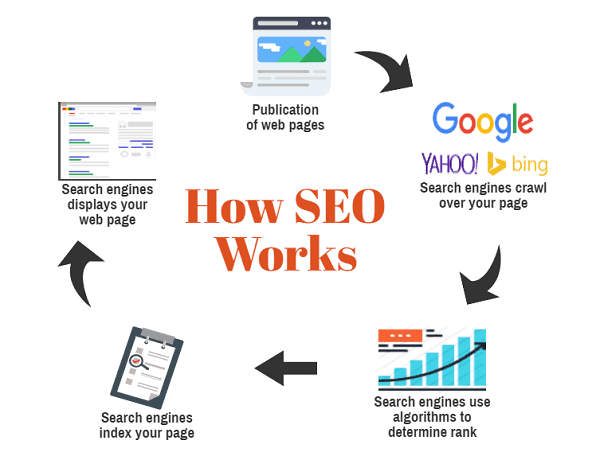Search engine optimization is a fundamental grouping of best practices and actionable strategies that ensure your site receives the traffic it merits. Google uses advanced algorithms to deliver search results that their users are most likely to find relevant and useful.
The algorithms are designed to favor sites that provide better user experiences.
SEO is a tool that helps to improve your entire site including its speed, content, architecture and functionality so that it:
Is relevant
Provides value
Satisfies a need
Is easy to find
Is SEO Necessary?
As long as search engine algorithms keep changing, SEO remains critical.
Algorithms frequently change in an attempt to keep up with current trends. Changes typically have one overall objective:
Provide a better user experience
The changes can impact any number of elements such as content, speed or structure. Following strong SEO practices and staying current with algorithm updates helps protect you from decreased traffic.
What is Mobile-First Indexing and How Does it Affect SEO?
To illustrate the changing updates, consider the recent mobile-first indexing change.
In a nutshell, mobile-first indexing means that if you have a mobile site, that’s what Google will index for your business not your desktop site. For companies using certain mobile architectures, this update spelled significant traffic drops.
Ongoing SEO strategy helps to make sure that your site not only performs well in the present, but also evolves with the coming changes.
Black Hat and Outdated SEO
Blackhat and outdated SEO practices are ineffective and could result in considerable penalties. These tactics include:
Purchasing backlinks. Backlinks have tremendous value when it comes to SEO, but quality dramatically outweighs quantity. In the past, some SEO experts would create hundreds of backlinks for their clients on pseudo-blogs with little traffic, numerous ads, and low-value content. These backlinks now carry little to no value at all.
Duplicate content. In the past, search engines could be manipulated by creating large websites and reusing content from pages that already exist, whether on your site or another. Duplicate and stolen content will only hurt your rankings, if not completely remove you from Google.
Keyword stuffing. You can only use the term “smart tv with free shipping” so many times before smart “tv with free shipping” starts to sound repetitive and unnatural, providing a sub-par experience for a buyer looking for a smart tv that ships for free. Google does not reward sites that offer sub-par experiences. In fact, they often penalize them.
Pro tip: If you’ve worked with an agency that may have purchased backlinks for your site, they could be hurting your rankings. If you can’t get the backlink removed, try disavowing it.
Penalties Hurt
Google’s intentions are pretty clear. They want their users to get the best results possible when performing a search. They want high-quality sites with high-quality content.
Sites using black hat or outdated SEO to manipulate the search rankings subject themselves to penalties.
There are two types of penalties:
Manual penalties. Google levies manual penalties when someone breaches their terms of service: buying links, using redirects, cloaking, or spreading a virus. These penalties come directly from a Google employee. They restrict your site from the index and require an appeal to remove.
Algorithmic penalties. These penalties are more common and happen as a result of lacking or improper SEO. They’re system generated and directly impact your search rankings. Slow loading websites, keyword stuffing, and duplicate content are all examples of what could trigger an algorithmic penalty. You’ll still rank, but much lower.
Search algorithms do not take intent into account. Well-intentioned mistakes are just as likely to draw a penalty as deceitful strategies. Without search traffic, your business suffers. Getting your site’s reputation back is difficult.
Some possible penalty triggers include:
Spyware
Adware
Viruses
Hidden links
Text cloaking
Redirects
Keyword stuffing
Duplicate content
Slow load times
Thin content
Backlinks from disreputable sites
Not following mobile-friendly best practices
Image Courtesy of IntenseBlog.com
Important SEO Factors
There are hundreds of SEO factors relating to your site and its content. SEO factors change as new updates occur. When considering your site’s SEO, pay attention to:
Design (responsive, AMP, M-dot, dynamic)
Titles and subheads
Meta descriptions
Content value and relevancy
Content accuracy
Internal and external links
Load speed
Mobile-friendly compliance
Domain Authority (DA)
Mobile-first indexing
Keywords
URL structure
The best way to evaluate your site’s SEO factors is by performing an SEO audit.
You May Not Like an Audit, But You Need One
An audit involves using a specialist to examine your site’s effectiveness and adherence to best practices. Audits are useful for identifying problems that are hurting your ranking and for identifying opportunities to improve.
They produce the foundation for any new SEO campaign or overhaul, offering an assessment in areas like:
Functionality. Are users able to do what they need to do? If it’s difficult to navigate your site, complete a form, or make a purchase, visitors will leave and head for the next search result.
Formatting. Are your page elements appropriately formatted to allow for indexing? If Google can’t crawl your page, then it’s all for nothing.
Internal links. A robust internal link structure using proper anchor-text phrases is critical to SEO success.
Content. Sites need fresh, accurate, and relevant content in multiple formats. If your site can’t answer searcher questions, why drive traffic there?
Mobile-first compliance. If you aren’t using a responsive web design and your mobile site lacks the quality of your desktop site, you could be at risk of losing significant traffic.
Code. It’s not only about content and links. Patchwork code impedes indexing and contributes to a poor user experience. An audit will identify these problems.
URLs. They matter. URLs shouldn’t be unreadable. They should be short and simple while providing a visitor with an idea of the page’s purpose.
What is On-Page and Off-Page SEO?
As you can see, SEO is more than just keywords. SEO covers a range of factors both visible and behind the scenes. However, your website or page ranking isn’t determined solely by its inherent properties.
Factors outside of your direct control also impact your performance.
On-page SEO consists of measures taken within the structure and content of your site and its pages.
Off-page SEO involves factors outside of your website, such as backlinks and brand mentions. These factors weigh heavily on your ranking.
Search engine algorithms are proprietary and secret, but most agree that off-page SEO is just as (if not more) important than on-page SEO with estimates of its algorithm weight ranging from 40 to 70 percent.
On-Page SEO
On-page SEO is under your control. It involves factors that you can implement and adjust. On-page SEO focuses on functionality, content, and keyword research.
While keyword stuffing is highly discouraged, keyword research and proper usage are crucial to a successful SEO campaign. Whether it’s for pay-per-click (PPC) ads or organic ranking, keyword research enables you to provide relevant information to the searchers that need it most.
Keyword research can also show you what your competitors are doing and what may or may not be working for them. For PPC purposes, talented SEO keyword analysts can identify the most cost-effective, likely-to-convert search terms to maximize your marketing dollars. They can even exclude your ad from showing up when searchers use phrases that are less likely to convert.
Content. Your site needs to be a resource if you want to rank. Merely offering a service isn’t good enough. Provide searchers with answers to their questions through valuable niche-specific content in multiple formats such as blog posts, whitepapers, videos, and case studies. This content should be optimized and mapped to corresponding keyword searches.
Copy. The words on your service or product pages are just as important as what’s in your content. Be sure that they’re keyword optimized, accurate, and well-written.
Functionality. As covered above, load time, proper coding, and ease-of-use are important factors when determining the likelihood that your site provides a positive user experience.
Off-Page SEO
Strong on-page SEO cultivates off-page SEO, but you can still give it a boost.
By providing searchers with engaging, shareable content that serves a purpose, you gain backlinks. They’re the crown jewel of off-page SEO.
Backlinks are links on another website that lead back to your page. They’re like reputation points in a credibility-building game.
The more respected the site giving you a backlink, the more valuable that backlink is. Having higher backlink credibility gives you a ranking advantage when compared to other sites with similar services.
Blog posts filled with useful information earn more clicks by helping you to rank higher.
Do not buy backlinks. It can lead to penalties and hurt your ranking. The best backlinks are organic. Try these methods to increase your organic backlinks:
Create and share new content and news through multiple social media platforms
Place links to your business in local and national directories
Interact with social media and blog comments
Pro tip: An excellent way to build backlinks is by offering to guest-post on industry-specific and credible blogs, like trade publications or industry journals. A link back to your site in your author’s bio carries backlink weight, so provide useful content to ensure that the post is shared or sourced.
Backlinks carry varying value, depending on the source. Some factors that contribute are:
Domain or Page Authority (DA & PA). These are scores that reflect the credibility of a site or page. The higher the score, the more credible and authoritative the site which reflects well on the backlinks within that page. These backlinks are worth more to you than those from sites with a low DA score.
Pseudo-blogs or spam sites. Backlinks in these blogs are generally worthless. They can also detract from your credibility. See the tip above about disavowing them.
Relevance. Backlinks from outside your niche don’t carry as much weight as those within.






0 Comments